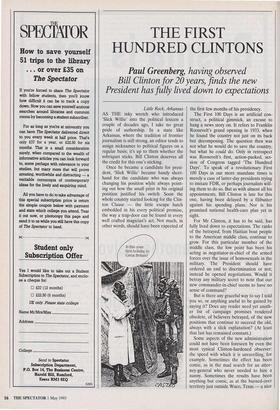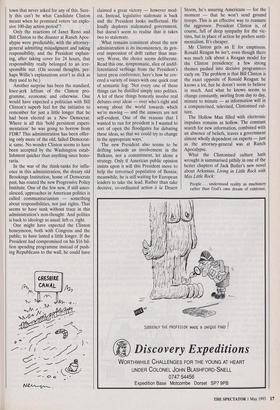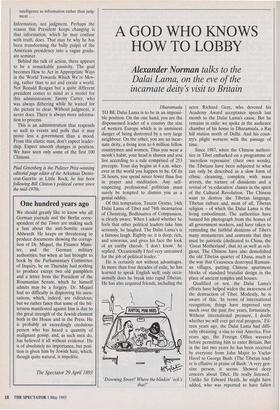THE FIRST HUNDRED CLINTONS
Paul Greenberg, having observed
Bill Clinton for 20 years, finds the new President has fully lived down to expectations
Little Rock, Arkansas AS THE inky wretch who introduced `Slick Willie' into the political lexicon a couple of decades ago, I take no great pride of authorship. In a state like Arkansas, where the tradition of frontier journalism is still strong, an editor tends to assign nicknames to political figures on a regular basis; it's up to them whether the sobriquet sticks. Bill Clinton deserves all the credit for this one's sticking.
Once he became a candidate for presi- dent, 'Slick Willie' became handy short- hand for the candidate who was always changing his position while always point- ing out how the small print in his original position justified his switch. Soon the whole country started looking for the Clin- ton Clause — the little escape hatch embedded in his every political promise, the way a trap-door can be found in every well crafted magician's act. Not much, in other words, should have been expected of the first few months of his presidency.
The First 100 Days is an artificial con- struct, a political gimmick, an excuse to hang a news story on. It refers to Franklin Roosevelt's grand opening in 1933, when he found the country not just on its back but decomposing. The question then was not what he would do to save the country, but what he could do. Only in retrospect was Roosevelt's first, action-packed, ses- sion of Congress tagged 'The Hundred Days'. To speak of a revolutionary First 100 Days in our more mundane times is merely a case of latter-day presidents trying to imitate FDR, or perhaps journalists will- ing them to do so. But as with almost all his appointments, Bill Clinton is late for this one, having been delayed by a filibuster against his spending plans. Nor is his promised national health-care plan yet in sight.
For Mr Clinton, it has to be said, has fully lived down to expectations. The ranks of the betrayed, from Haitian boat people to the American middle class, continue to grow. For this particular member of the middle class, the low point has been his acting as negotiator-in-chief of the armed forces over the issue of homosexuals in the military. The President should have ordered an end to discrimination or not; instead he opened negotiations. Would it betray any military secret to note that our new commander-in-chief seems to have no sense of command?
But is there any graceful way to say I told you so, or anything useful to be gained by saying it? Does any reader need yet anoth- er list of campaign promises rendered obsolete, of believers betrayed, of the new positions that continue to succeed the old, always with a slick explanation? (At least that last has remained constant.) Some aspects of the new administration could not have been foreseen by even the most cynical Clinton-hardened observer: the speed with which it is unravelling, for example. Sometimes the effect has been comic, as in the mad search for an attor- ney-general who never needed to hire a nanny. Sometimes the results have been anything but comic, as at the burned-over territory just outside Waco, Texas — a nice
town that never asked for any of this. Sure- ly this can't be what Candidate Clinton meant when he promised voters 'an explo- sive 100-day action period'?
Only the reactions of Janet Reno and Bill Clinton to the disaster at Ranch Apoc- alypse were predictable, with the attorney- general admitting misjudgment and taking responsibility, and the President explain- ing, after taking cover for 24 hours, that responsibility really belonged to an irre- sponsible nut. (On second thoughts, per- haps Willie's explanations aren't as slick as they used to be.) Another surprise has been the standard, knee-jerk leftism of the Clinton pro- gramme, economic and otherwise. One would have expected a politician with Bill Clinton's superb feel for the initiative to remember for just a little longer that he had been elected as a New Democrat. Where is all this 'bold persistent experi- mentation' he was going to borrow from FDR? This administration has been offer- ing only more of the old, failed Democrat- ic same. No wonder Clinton seems to have been accepted by the Washington estab- lishment quicker than anything since hono- raria.
In the war of the think-tanks for influ- ence in this administration, the dreary old Brookings Institution, home of Democrats past, has routed the new Progressive Policy Institute. One of the few new, if still unco- alesced, approaches in American politics is called communitarianism — something about responsibilities, not just rights. That seems to have sunk without trace in this administration's non-thought. And politics is back to ideology as usual: left vs. right. One might have expected the Clinton honeymoon, both with Congress and the public, to have lasted a little longer. If the President had compromised on his $16 bil- lion spending programme instead of push- ing Republicans to the wall, he could have claimed a great victory — however mod- est. Instead, legislative stalemate is back and the President looks ineffectual. He loudly deplores stalemated government, but doesn't seem to realise that it takes two to stalemate.
What remains consistent about the new administration is its inconsistency, its gen- eral impression of drift rather than mas- tery. Worse, the choice seems deliberate. Read this one, symptomatic, slice of undif- ferentiated verbiage from the President's latest press conference; here's how he cov- ered a variety of issues with one quick coat of semantic fog: 'Not every one of these things can be distilled simply into politics. A lot of these things honestly involve real debates over ideas — over who's right and wrong about the world towards which we're moving — and the answers are not self-evident. One of the reasons that I wanted to run for president is I wanted to sort of open the floodgates for debating these ideas, so that we could try to change in the appropriate ways.' The new President also seems to be drifting towards an involvement in the Balkans, not a commitment, let alone a strategy. Only if American public opinion insists upon it will this President move to help the terrorised population of Bosnia; meanwhile, he is still waiting for European leaders to take the lead. Rather than take decisive, co-ordinated action a la Desert Storm, he's assuring Americans — for the moment — that he won't send ground troops. This is an effective way to reassure the aggressor. President Clinton is, of course, full of deep sympathy for the vic- tims, but in place of action he prefers senti- mentalism. It's cheaper. Mr Clinton gets an E for emptiness. Ronald Reagan he isn't, even though there was much talk about a Reagan model for the Clinton presidency: a few strong themes pushed into decisive programmes early on. The problem is that Bill Clinton is the exact opposite of Ronald Reagan: he knows a lot, but he doesn't seem to believe in much. And what he knows seems to change constantly, swirling from day to day, minute to minute — as information will in a computerised, televised, Clintonised cul- ture. The Hollow Man filled with electronic impulses remains as hollow. The constant search for new information, combined with an absence of beliefs, leaves a government almost wholly dependent on experts — just as the attorney-general was at Ranch Apocalypse. What the Clintonised culture hath wrought is summarised pithily in one of the better chapters of Jack Butler's new novel about Arkansas, Living in Little Rock with Miss Little Rock:
People ... understood reality as machinery rather than God's own dream of existence, intelligence as information rather than judg- ment ...
Information, not judgment. Perhaps the reason this President keeps changing is that information, which he may confuse with truth, does. That may be why he has been transforming the bully pulpit of the American presidency into a vague gradu- ate seminar.
Behind the talk of action, there appears to be a remarkable passivity. The goal becomes How to Act in Appropriate Ways in the World Towards Which We're Mov- ing, rather than to act and create a world. Not Ronald Reagan but a quite different president comes to mind as a model for this administration: Jimmy Carter, who was always dithering while he waited for the picture to clear. Without judgment, it never does. There is always more informa- tion to process.
This is an administration that responds so well to events and polls that it may prove less a government than a mood. From this elastic man, don't expect leader- ship. Expect smooth changes in position. We have seen only some of the first 100 Clintons.
Paul Greenberg is the Pulitzer Prize-winning editorial page editor of the Arkansas Demo- crat-Gazette at Little Rock; he has been following Bill Clinton's political career since the mid-1970s.




























































 Previous page
Previous page